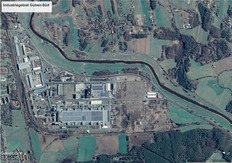- Investment of €470M planned for lithium hydroxide converter in Brandenburg.
- Production start expected in 2024, employing 160 staff.
- Annual output to be 24,000 tons, supporting 500,000 EVs.
- 50% of raw materials to be sourced from recycled batteries by 2030.

Investment and Production Plans
Rock Tech Lithium Inc. plans to invest €470 million to build Europe's first lithium hydroxide converter in Guben, Brandenburg. The facility aims to start production in 2024, employing around 160 technicians, engineers, and production staff. The plant will produce approximately 24,000 metric tons of lithium hydroxide annually, sufficient for around 500,000 electric vehicles.
Site and Infrastructure
The company has acquired a 12-hectare site in the Guben South industrial park, which offers ample space for all production steps in lithium refining. The location benefits from good traffic connections, which may be further enhanced by a potential rail link. Locally sourced renewable energy will be used for production.
Strategic Importance
The project is a key component of the European battery value chain, crucial for the region's e-mobility cluster. The EU Commission estimates that European lithium demand for electric car batteries will increase 18-fold by 2030 and 60-fold by 2050, making a sustainable raw material supply strategically important for the automotive industry.
Local and Regional Impact
Brandenburg's Economics Minister, Jörg Steinbach, emphasized that the project strengthens the region's position as a future center of European e-mobility. The decision to locate in Guben followed a Europe-wide site search, with the city chosen for its excellent conditions. Local officials, including Guben's mayor and the District Administrator of Spree-Neiße, expressed their support and highlighted the positive impact on the region's economic development.
Future Goals
Rock Tech Lithium aims to create a closed loop for lithium, with plans to source around 50% of its raw materials from recycled batteries by 2030. The company is working closely with authorities, experts, and local stakeholders to ensure the project's success.

